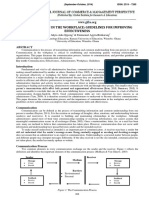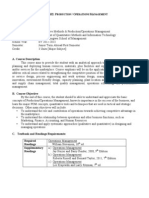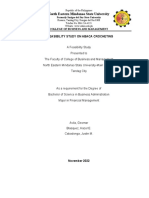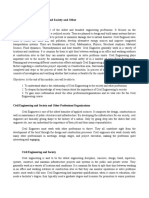Part II: A Stakeholder Perspective Chapter 4: Corporate Stakeholder Responsibility
Uploaded by
Jesslyn WongPart II: A Stakeholder Perspective Chapter 4: Corporate Stakeholder Responsibility
Uploaded by
Jesslyn WongPart II: A Stakeholder Perspective
Chapter 4: Corporate Stakeholder Responsibility
1. CSR: A Corporate Responsibility?
• Whose responsibility is CSR?
The term corporate social responsibility suggests that
such behavior is the responsibility of corporations--that
the corporation has a responsibility to society. Is this the
best way to think about CSR? Does it produce optimal
outcomes? In reality, where does the motivation for
socially responsible behavior come from?
Chandler, Strategic Corporate Social Responsibility,
2
5e. © SAGE Publishing, 2020
2. CSR: A Corporate Responsibility?
• What does it mean to be responsible?
To be responsible for something is to be accountable. If
there is no consequence for doing (or not doing)
something, there is no responsibility. Stakeholders define
the firm’s responsibility by rewarding behavior they like
and punishing behavior they dislike.
Chandler, Strategic Corporate Social Responsibility,
3
5e. © SAGE Publishing, 2020
Chandler, Strategic Corporate Social Responsibility,
4
5e. © SAGE Publishing, 2020
4. Inequality
“In 1976 the richest 1 percent of Americans took home
about 8.5 percent of our national income. Today they take
home more than 20 percent. In major sectors of the
economy – banking, airlines, agriculture, pharmaceuticals,
telecommunications – economic power is increasingly
concentrated in a small number of companies.”
Chandler, Strategic Corporate Social Responsibility, 5e. © SAGE Publishing, 2020 5
Chandler, Strategic Corporate Social Responsibility,
6
5e. © SAGE Publishing, 2020
6. Milton Friedman Versus Charles Handy
The business of business is business?
versus
Enlightened business?
Chandler, Strategic Corporate Social Responsibility,
7
5e. © SAGE Publishing, 2020
7. Milton Friedman Versus Charles Handy
• For Friedman:
• Profit is an end in itself.
• Value to society is maximized if individual actors pursue
their self-interest above all else.
• For Handy:
• Profit is only a means to a larger end.
• A firm should not remain in existence just because it is
profitable but because it is meeting a need that society
as a whole values.
Chandler, Strategic Corporate Social Responsibility,
8
5e. © SAGE Publishing, 2020
9
10
10. CSR: A Stakeholder Responsibility?
The reason that fast-food companies pay the low wages that they do,
for example, is that they are able to staff all of their open positions at
that rate with employees who have the skill set needed to do the job. In
other words, employees value those jobs either because they have no
alternative or because any alternative pays at a lower rate. For this to
change, a stakeholder needs to act--either the government (by
increasing the minimum wage) or employees (refusing to work at that
wage rate) or consumers (by refusing to shop at McDonald’s because
they are unhappy with the wages the company is paying its employees).
Until one of its key stakeholders sends a serious message to McDonald’s
that its current wages are unacceptable, then McDonald’s will (and
should) continue doing exactly what it is doing.
Chandler, Strategic Corporate Social Responsibility,
11
5e. © SAGE Publishing, 2020
11. CSR: A Stakeholder Responsibility?
• The responsibilities of stakeholders are central to CSR:
Firms do not define our societal values; instead they
reflect them. Firms are very good at providing us with
what we actually want (rather than what we say we
want). As such, all stakeholders have an obligation to help
design the society in which they want to live and work.
Chandler, Strategic Corporate Social Responsibility,
12
5e. © SAGE Publishing, 2020
12. Corporate Stakeholder Responsibility
A responsibility among all of a firm’s stakeholders to
hold the firm to account for its actions by rewarding
behavior that meets expectations and punishing
behavior that does not meet expectations.
Chandler, Strategic Corporate Social Responsibility,
13
5e. © SAGE Publishing, 2020
14
15
15. Firm and Stakeholders as Independent
Actors
Chandler, Strategic Corporate Social Responsibility,
16
5e. © SAGE Publishing, 2020
16. Firm and Stakeholders as Integrated Actors
Chandler, Strategic Corporate Social Responsibility,
17
5e. © SAGE Publishing, 2020
17. Engaged Stakeholders
• Engaged stakeholders shape society, rather than exist in a society
shaped by others:
Caring stakeholders (see Figure 4.2)
Informed stakeholders (see Figure 4.3)
Transparent stakeholders (see Figures 4.4 and 4.5)
Educated stakeholders (see the PRME Principles)
Chandler, Strategic Corporate Social Responsibility,
18
5e. © SAGE Publishing, 2020
18. The Strategic CSR Window of Opportunity
Chandler, Strategic Corporate Social Responsibility,
19
5e. © SAGE Publishing, 2020
19. The CSR Sweet Spot Versus Danger Zone
Chandler, Strategic Corporate Social Responsibility,
20
5e. © SAGE Publishing, 2020
20. Perceptions of Business Executives
Chandler, Strategic Corporate Social Responsibility,
21
5e. © SAGE Publishing, 2020
21. Consumers’ Willingness to Pay for CSR (2011–2014)
Chandler, Strategic Corporate Social Responsibility,
22
5e. © SAGE Publishing, 2020
22. The United Nations PRME Principles
Principle 1: Purpose
Principle 2: Values
Principle 3: Method
Principle 4: Research
Principle 5: Partnership
Principle 6: Dialog
Chandler, Strategic Corporate Social Responsibility,
23
5e. © SAGE Publishing, 2020
23. A Stakeholder’s Responsibilities
Chandler, Strategic Corporate Social Responsibility,
24
5e. © SAGE Publishing, 2020
24. Is a Manager a Professional?
• There are three main characteristics that define what it means to
belong to a profession:
1. A sense of duty beyond the self.
2. A certified body of knowledge.
3. A code of ethics.
Chandler, Strategic Corporate Social Responsibility,
25
5e. © SAGE Publishing, 2020
25. Questions for Discussion and Review
1. Who is responsible for CSR--firms or their stakeholders? Why? Is the
responsibility equal or does one party have a greater responsibility?
2. List three points in favor of Friedman’s view of the firm and its
responsibilities and three points in favor of Handy’s view. Which
position do you agree with? Why?
3. Would you report a classmate you suspected of cheating at school?
Why or why not? What is the role of the business school in teaching
ethics to its students?
4. Think about a recent example of a firm that changed its behavior in
response to a stakeholder’s demands. Is this an example of corporate
stakeholder responsibility?
5. If a firm’s stakeholders condone the irresponsible behavior of a firm,
should the firm keep acting this way or should it change? Why?
Chandler, Strategic Corporate Social Responsibility,
26
5e. © SAGE Publishing, 2020
Chandler, Strategic Corporate Social Responsibility,
27
5e. © SAGE Publishing, 2020
27. First Watch 2 videos on Learning Mall
Chandler, Strategic Corporate Social Responsibility,
28
5e. © SAGE Publishing, 2020
Chandler, Strategic Corporate Social Responsibility,
29
5e. © SAGE Publishing, 2020
29. The Financial Crisis
• As Citibank’s Chuck Prince said in 2007, shortly before his ouster as
CEO later that year:
“As long as the music is playing, you’ve got to
get up and dance. We’re still dancing.”
Chandler, Strategic Corporate Social Responsibility, 5e. © SAGE Publishing, 2020 30
30. Moral Hazard
To take risk in search of personal benefit where the
consequences of that risk are not born by the individual.
The effect is to privatize gains and socialize losses.
Chandler, Strategic Corporate Social Responsibility, 5e. © SAGE Publishing, 2020 31
31. Critiques of Capitalism
“What if the crisis of 2008 represents something much
more fundamental than a deep recession? What if it’s
telling us that the whole growth model we created over the
last 50 years is simply unsustainable economically and
ecologically and that 2008 was when we hit the wall--when
Mother Nature and the market both said: ‘No more?’”
—Thomas Friedman, The New York Times
Chandler, Strategic Corporate Social Responsibility, 5e. © SAGE Publishing, 2020 32
32. The Cost of the Financial Crisis
Chandler, Strategic Corporate Social Responsibility, 5e. © SAGE Publishing, 2020 33
33. The Financial Crisis--Ten Years On
• Lehman Brothers (1850–2008):
Chandler, Strategic Corporate Social Responsibility, 5e. © SAGE Publishing, 2020 34
34. The Finance Industry
“Oversight and disclosure have been improved and
capital-adequacy rules toughened. But some of these
rules are now being relaxed, at least in America, and the
financial industry’s weight in the world economy has
scarcely changed. As a share of American GDP it has
actually increased somewhat since 2007.”
Chandler, Strategic Corporate Social Responsibility, 5e. © SAGE Publishing, 2020 35
35. The Institutional Response
• The response has not lived up to many people’s expectations. This is
apparent in three areas, in particular:
1. The system remains largely unchanged.
2. Few individuals were ever held to account.
3. The core problem, excessive personal debt, remains.
Chandler, Strategic Corporate Social Responsibility, 5e. © SAGE Publishing, 2020 36
CORPORATE SOCIAL
RESPONSIBILITY (CSR)
Lecturer: Dr. Xuanwei Cao
Office: BS226
Office Hour: 15:00-17:00 Wed.
Email: xuanwei.cao@xjtlu.edu.cn
You might also like
- Part IV: A Behavioral Perspective Chapter 7: Markets and ProfitNo ratings yetPart IV: A Behavioral Perspective Chapter 7: Markets and Profit29 pages
- Examples of Corporate Social ResponsibilityNo ratings yetExamples of Corporate Social Responsibility6 pages
- Chapter 3 - Organizational Objectives - StudentsNo ratings yetChapter 3 - Organizational Objectives - Students7 pages
- Vehicle and Other Major Purchases: File Edit ViewNo ratings yetVehicle and Other Major Purchases: File Edit View22 pages
- Module 3 Key Players in The Project Management ProcessNo ratings yetModule 3 Key Players in The Project Management Process27 pages
- Friedman - The Social Responsibility of BusinessNo ratings yetFriedman - The Social Responsibility of Business6 pages
- Situation of The Philippines On The Area of EnergyNo ratings yetSituation of The Philippines On The Area of Energy10 pages
- Lafarge Cement V Continental Cement 443 SCRA 522No ratings yetLafarge Cement V Continental Cement 443 SCRA 5226 pages
- Communication in The Workplace Guidelines For Improving EffectivenessNo ratings yetCommunication in The Workplace Guidelines For Improving Effectiveness6 pages
- Political Science First Term Finals ReviewerNo ratings yetPolitical Science First Term Finals Reviewer5 pages
- Encountering Jesus in The Midst of StruggleNo ratings yetEncountering Jesus in The Midst of Struggle23 pages
- Probability Concepts and Applications: To AccompanyNo ratings yetProbability Concepts and Applications: To Accompany98 pages
- Chapter 2 Strategic Dimension of QualityNo ratings yetChapter 2 Strategic Dimension of Quality3 pages
- Personal Data Sheet: Jbcform No. 1 2x2 I.D. PictureNo ratings yetPersonal Data Sheet: Jbcform No. 1 2x2 I.D. Picture6 pages
- Chapter 5: Moral Philosophy and Reasoning, Cultural Relativism, Skepticism and SubjectivismNo ratings yetChapter 5: Moral Philosophy and Reasoning, Cultural Relativism, Skepticism and Subjectivism3 pages
- Kantian Ethics: Prepared For Class Discussion by Prof.S.SuryanarayananNo ratings yetKantian Ethics: Prepared For Class Discussion by Prof.S.Suryanarayanan12 pages
- Presentation Organizational Structure and CultureNo ratings yetPresentation Organizational Structure and Culture36 pages
- Philosophy 101: Ethics Instructor: Neil Bryan N. Moninio: University of Cebu Banilad CampusNo ratings yetPhilosophy 101: Ethics Instructor: Neil Bryan N. Moninio: University of Cebu Banilad Campus4 pages
- Tenets of Effective Monetary Policy in The Philippines: Jasmin E. DacioNo ratings yetTenets of Effective Monetary Policy in The Philippines: Jasmin E. Dacio14 pages
- VALIDATION-LETTER-AND-VALIDATION-SHEET EditedNo ratings yetVALIDATION-LETTER-AND-VALIDATION-SHEET Edited7 pages
- Pricing Strategy On Food Among Selected Catering Services in MalasiquiNo ratings yetPricing Strategy On Food Among Selected Catering Services in Malasiqui12 pages
- Small Business Hair Salon Owners Effective Marketing Strategies-2No ratings yetSmall Business Hair Salon Owners Effective Marketing Strategies-236 pages
- Statistical Analysis in Software Application 2No ratings yetStatistical Analysis in Software Application 26 pages
- Apple's Strengths (Internal Strategic Factors)No ratings yetApple's Strengths (Internal Strategic Factors)3 pages
- Part V: A Strategic Perspective Chapter 10: Strategic CSRNo ratings yetPart V: A Strategic Perspective Chapter 10: Strategic CSR21 pages
- Part V: A Strategic Perspective Chapter 9: Strategy + CSRNo ratings yetPart V: A Strategic Perspective Chapter 9: Strategy + CSR52 pages
- Part VI: A Sustainable Perspective Chapter 12: Sustainable Value CreationNo ratings yetPart VI: A Sustainable Perspective Chapter 12: Sustainable Value Creation21 pages
- Part III: A Legal Perspective Chapter 6: Who Owns The Firm?No ratings yetPart III: A Legal Perspective Chapter 6: Who Owns The Firm?32 pages
- Part II: A Stakeholder Perspective Chapter 3: Stakeholder TheoryNo ratings yetPart II: A Stakeholder Perspective Chapter 3: Stakeholder Theory17 pages
- Get Light and Vacuum The Wave Particle Nature of the Light and the Quantum Vacuum Electromagnetic Theory and Quantum Electrodynamics Beyond the Standard Model 2nd Edition Constantin Meis PDF ebook with Full Chapters Now100% (1)Get Light and Vacuum The Wave Particle Nature of the Light and the Quantum Vacuum Electromagnetic Theory and Quantum Electrodynamics Beyond the Standard Model 2nd Edition Constantin Meis PDF ebook with Full Chapters Now65 pages
- 2007 EM16-16R Babu Et Al - Mod & Inv of Mag and VLF-EM DataNo ratings yet2007 EM16-16R Babu Et Al - Mod & Inv of Mag and VLF-EM Data8 pages
- 2024 Panganiban Campus Landuse Map Complexes2No ratings yet2024 Panganiban Campus Landuse Map Complexes21 page
- FINAL 01 RPMS 2022-2023 PURPLE TEMPLATE - Results-Based-Performance-Management-SystemNo ratings yetFINAL 01 RPMS 2022-2023 PURPLE TEMPLATE - Results-Based-Performance-Management-System43 pages
- Pharmacovigilance in Clinical Trials: Version 04 Feb 2021No ratings yetPharmacovigilance in Clinical Trials: Version 04 Feb 202181 pages
- 7th second term model question paper Social English medium SAMAGRA (2)No ratings yet7th second term model question paper Social English medium SAMAGRA (2)6 pages
- Virtual Lecture - 1-Introduction-Turbomachine100% (2)Virtual Lecture - 1-Introduction-Turbomachine48 pages
- INDOROCK 2017 Paper - Storage of Crude Oil in Solution Mined Salt CavernsNo ratings yetINDOROCK 2017 Paper - Storage of Crude Oil in Solution Mined Salt Caverns10 pages
- 2021 SPM - Listening - Module Bahasa - InggerisNo ratings yet2021 SPM - Listening - Module Bahasa - Inggeris57 pages
- Chapter 11 Introduction To Urban HydrologyNo ratings yetChapter 11 Introduction To Urban Hydrology7 pages
- Towards Italian Opera Houses: A Review of Acoustic Design in Pre-Sabine ScholarsNo ratings yetTowards Italian Opera Houses: A Review of Acoustic Design in Pre-Sabine Scholars29 pages
- Civil Engineering and Society and Other Engineering Professions - 1No ratings yetCivil Engineering and Society and Other Engineering Professions - 16 pages
- Lithium-Ion Battery System For TelecommunicationNo ratings yetLithium-Ion Battery System For Telecommunication4 pages
- Part IV: A Behavioral Perspective Chapter 7: Markets and ProfitPart IV: A Behavioral Perspective Chapter 7: Markets and Profit
- Module 3 Key Players in The Project Management ProcessModule 3 Key Players in The Project Management Process
- Situation of The Philippines On The Area of EnergySituation of The Philippines On The Area of Energy
- Communication in The Workplace Guidelines For Improving EffectivenessCommunication in The Workplace Guidelines For Improving Effectiveness
- Probability Concepts and Applications: To AccompanyProbability Concepts and Applications: To Accompany
- Personal Data Sheet: Jbcform No. 1 2x2 I.D. PicturePersonal Data Sheet: Jbcform No. 1 2x2 I.D. Picture
- Chapter 5: Moral Philosophy and Reasoning, Cultural Relativism, Skepticism and SubjectivismChapter 5: Moral Philosophy and Reasoning, Cultural Relativism, Skepticism and Subjectivism
- Kantian Ethics: Prepared For Class Discussion by Prof.S.SuryanarayananKantian Ethics: Prepared For Class Discussion by Prof.S.Suryanarayanan
- Philosophy 101: Ethics Instructor: Neil Bryan N. Moninio: University of Cebu Banilad CampusPhilosophy 101: Ethics Instructor: Neil Bryan N. Moninio: University of Cebu Banilad Campus
- Tenets of Effective Monetary Policy in The Philippines: Jasmin E. DacioTenets of Effective Monetary Policy in The Philippines: Jasmin E. Dacio
- Pricing Strategy On Food Among Selected Catering Services in MalasiquiPricing Strategy On Food Among Selected Catering Services in Malasiqui
- Small Business Hair Salon Owners Effective Marketing Strategies-2Small Business Hair Salon Owners Effective Marketing Strategies-2
- Part V: A Strategic Perspective Chapter 10: Strategic CSRPart V: A Strategic Perspective Chapter 10: Strategic CSR
- Part V: A Strategic Perspective Chapter 9: Strategy + CSRPart V: A Strategic Perspective Chapter 9: Strategy + CSR
- Part VI: A Sustainable Perspective Chapter 12: Sustainable Value CreationPart VI: A Sustainable Perspective Chapter 12: Sustainable Value Creation
- Part III: A Legal Perspective Chapter 6: Who Owns The Firm?Part III: A Legal Perspective Chapter 6: Who Owns The Firm?
- Part II: A Stakeholder Perspective Chapter 3: Stakeholder TheoryPart II: A Stakeholder Perspective Chapter 3: Stakeholder Theory
- Get Light and Vacuum The Wave Particle Nature of the Light and the Quantum Vacuum Electromagnetic Theory and Quantum Electrodynamics Beyond the Standard Model 2nd Edition Constantin Meis PDF ebook with Full Chapters NowGet Light and Vacuum The Wave Particle Nature of the Light and the Quantum Vacuum Electromagnetic Theory and Quantum Electrodynamics Beyond the Standard Model 2nd Edition Constantin Meis PDF ebook with Full Chapters Now
- 2007 EM16-16R Babu Et Al - Mod & Inv of Mag and VLF-EM Data2007 EM16-16R Babu Et Al - Mod & Inv of Mag and VLF-EM Data
- FINAL 01 RPMS 2022-2023 PURPLE TEMPLATE - Results-Based-Performance-Management-SystemFINAL 01 RPMS 2022-2023 PURPLE TEMPLATE - Results-Based-Performance-Management-System
- Pharmacovigilance in Clinical Trials: Version 04 Feb 2021Pharmacovigilance in Clinical Trials: Version 04 Feb 2021
- 7th second term model question paper Social English medium SAMAGRA (2)7th second term model question paper Social English medium SAMAGRA (2)
- INDOROCK 2017 Paper - Storage of Crude Oil in Solution Mined Salt CavernsINDOROCK 2017 Paper - Storage of Crude Oil in Solution Mined Salt Caverns
- Towards Italian Opera Houses: A Review of Acoustic Design in Pre-Sabine ScholarsTowards Italian Opera Houses: A Review of Acoustic Design in Pre-Sabine Scholars
- Civil Engineering and Society and Other Engineering Professions - 1Civil Engineering and Society and Other Engineering Professions - 1

































































































